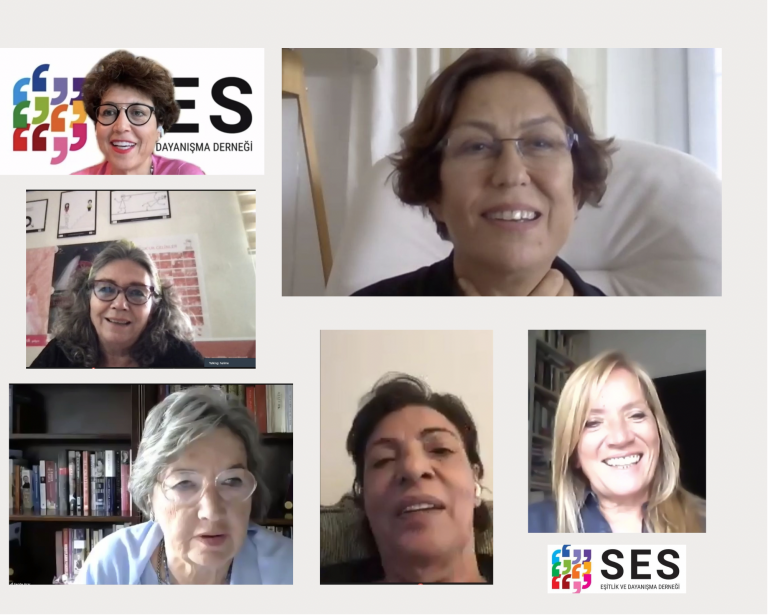As SES Equality and Solidarity Association, we hosted an event titled “Where are the women while the Future of Turkey is being shaped?” Contributors argued that the women’s movement should take a more significant role in the legal and political scene and prepare for the upcoming general elections.
SES Equality and Solidarity Association hosted an event titled “Where are the women while the Future of Turkey is being written?” that has brought together various actors within the women’s movement to discuss the state and the future of their struggle.
The event started with Professor Serpil Sancar’s presentation on the Gender Equality Monitoring Report in Turkey, prepared for CEID (Gender Equality Monitoring Association). Citing striking results from the report that followed the developments on gender equality in 16 thematic areas, Sancar also reflected on historical events and processes that shaped women’s struggle in Turkey.
Milestones of deterioration in women’s rights
Professor Sancar argued that a critical juncture was reached when the Directorate of Religious Affairs was given the task of protecting women and the family and when the word “women” was removed from the name of the Ministry of Women and Family in 2011. Similarly, another milestone was the fact that the General Directorate of the Status of Women stopped preparing a national action plan for gender equality since 2013.
Sancar also touched upon the changes desired to be made in the Turkish Penal Code (TCK) in order to legitimize early and forced marriages. She noted that the most symbolic of these moves is the abolition of the provision that imams who marry children under the age of 18 will not be punished.
Mentioning the meaning of Turkey’s withdrawal from the Istanbul Convention in her presentation, Sancar defined the move as “a concession made by the government to Salafist Islamism.”
Listing suggestions at the end of his presentation, Sancar underlined the following points:
- The national mechanism should be reconstructed in accordance with CEDAW
- Gender-insensitive laws need to be addressed and transformed
- Annual monitoring and publication of national action plans should be conducted
- Mainstreaming should be extended to key areas
- There should be at least 40 per cent of women managers and experts in the management of institutions that provide services to women.
After Sancar’s presentation, participants discussed what the place of women should be in Turkey’s future and expressed their views on the current duties and responsibilities of the women’s movement.
‘We should determine our demands and put pressure on political parties until the election.’
Speaking at the event, Prof. Dr Ayşe Güneş Ayata stated, “We have at least a year before the election. We should reach out to all political parties and try to persuade them on some fundamental issues. The top priority of these basic demands should be re-signing the Istanbul Convention and making it permanent.”
‘We should consider forming coalitions’
Prof. Dr. Feride Acar, on the other hand, stated that the social support of the women’s movement is still not strong at the desired level and underlined that all women should focus on the question of “what to do.” She said: “We need to think about forming some coalitions.”
‘There is a need for studies that shows women’s votes are not guaranteed.’
Hilal Dokuzcan stated, “There is male power, male government and male political parties in Turkey,” and added that it is necessary to think about what the rising women’s movement can do at the point where it can affect political parties. Dokuzcan said, “There is a need for studies that demonstrates women’s votes are not guaranteed.”
We need power
Seniye Nazik Işık said, “Being part of the power and aiming to be in power should be a priority for the women’s movement.” Touching on the women’s quota claim of political parties, Işık underlined, “Taking part in the representation system should not override the goal of power that we want to be a part of.”
Feminist consciousness is needed
Gülseren Onanç, who moderated the event, said, “I believe it is important that we bring women who prioritize feminist consciousness to the political stage, rather than just having women in the political arena because of their biological gender.”
Onanç made the following suggestion: “The women’s movement should now elect its own representatives and follow it. Let’s choose our representatives from among the feminist women who have fought in the women’s movement!”
‘We need to sit down at the bargaining table with political parties as soon as possible.’
Evaluating the current situation of the women’s movement, activist Nebahat Akkoç emphasized that women should put forward a strategy and organize until the general elections. “We now have to sit at the bargaining table with political parties. We have this power,” she said.


